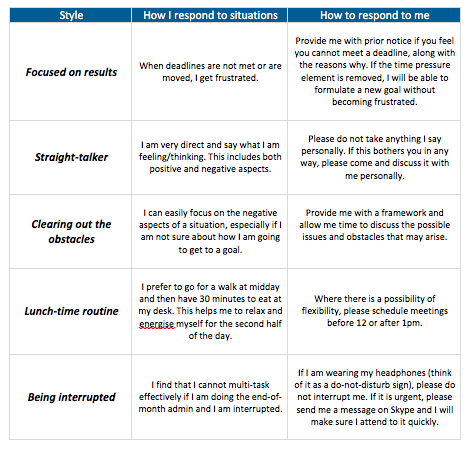Do you Know the Communication Styles of your Team?
Have you ever had a manager who micromanaged every aspect of your work? How about a manager who only ever looked for mistakes and never noticed the extra effort you put in? In other situations, some managers may come across as very relaxed and hands-off, to the point where their team feel they lack guidance.
Understanding how your Team Works and Communicates can help you become a Better Manager or Co-worker.
The fact is that whether you’re working closely with your manager or with people in a team, each person has a unique makeup that influences how they work and communicate with others. Based on the recipient’s style of working, there can either be a match (understanding and cohesion) or a mismatch (not understanding where the other person is coming from). It also goes without saying that a mismatch can affect team dynamics, relationships and ultimately can also impact on performance.
The team building exercise below is a fun and easy way for each individual to share their specific work styles with one another. It is especially relevant when new people move into management positions or come into the team, but it can also be used at any time as a refresher.
Team Building Exercise - What are the Work Styles of my Team?
Schedule a meeting with your team. Set aside 90 minutes. Tell everyone that you are going to be sharing your own work styles and how they may impact other people. Make the session interactive by asking your team if they identify with the information you have shared, and whether they have experienced you in a similar way. Maybe they have experienced you in a different way?

THEN: Ask your team to share some insights into their style of working and communication, using the same format. In order to do so effectively, ask them to consider the following:
-
Are you a more task oriented person, or a more people oriented person? While it is possible to be both, try to choose one.
-
What is most important to you, in terms of how work is done? Do you worry more about quality of work (the nitty gritty details being done correctly), the layout and visual aspects, adhering to deadlines etc.?
-
How do you tend to communicate? Consider how you would respond in a work-based conflict situation as one example of your communication.
-
What bothers you, in terms of the way that other people may work? Keep it focused on your own behaviour and responses, not pinpointing the behaviour of other people. For example: if someone is going to miss a deadline and does not notify me ahead of time, I tend to get very frustrated.
-
Do you have any personal quirks, preferences or habits that you would like to share? Perhaps you hate holding meetings early in the morning, or you become less effective when put under pressure.
Set aside about 30-40 minutes for your team to complete the exercise. Alternatively, you could ask each person to complete their list and schedule a follow up meeting at another time to discuss.
Lastly, be sure to stress that the process is voluntary. Individuals should only share what they are comfortable with. If they are not comfortable participating at all, they can also make that known publicly or privately.
Taking it Further with Objective Assessment-based Information
While the exercise above is a simple and fun way to gain insight into your team’s behaviours, the information gained may be limited or subjective. This is especially true if some members of the team are not very open, are shy or are not self-aware.
Assessments can be used to take the process further and determine the underlying personality, drivers, competencies and performance of your team. The result is very detailed and objective information, uncovering aspects that the individual him/herself may not be aware of. Depending on the type of assessment, the results can either be shared in a team-building workshop format or via one-on-one developmental feedback sessions.
Author
Caitlin is a Senior Psychologist & Marketing Specialist. Her focus is on research, thought leadership in the areas of Agility, engagement & talent management.